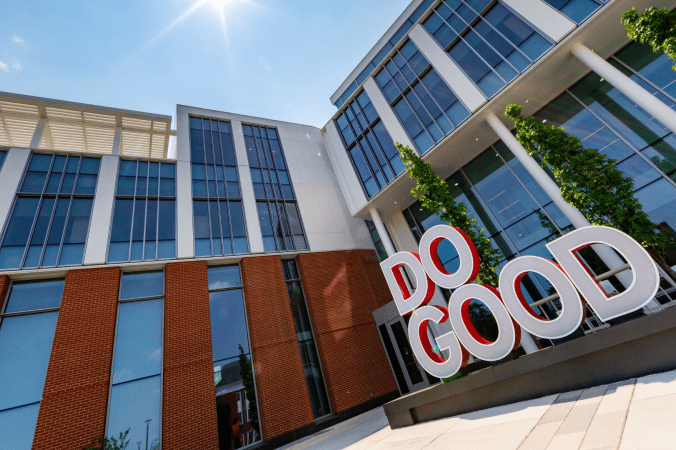Clark School Community Members Win Prestigious Campus Social Impact Award
Five Clark School community members are winners of the Provost’s Do Good Innovator Awards, recognizing their excellence in creating, nurturing, expanding, and amplifying “social impact through education, programs, and research, both inside and outside the classroom,” according to an announcement from Senior Vice President and Provost Jennifer King Rice. The university will celebrate its award winners at a March 7, 2024 campus event. “As engineers, we have a powerful opportunity to foster more equity and an improved quality of life. Our students, faculty, and staff work toward that goal every day. The Innovator Awards celebrate exemplary service in that pursuit and we are very proud to celebrate the Clark School’s award winners,” Dean Samuel Graham, Jr. said. “We hope their work serves as inspiration for others and look forward to its continued impact on society.” David Tomblin, College Park Scholars Program Director: Tomblin’s service learning course, “Infrastructure and Society,” addresses the root causes of America’s infrastructure crisis and underscores its significance in a functioning society. The course provides students with an opportunity to delve into the emerging social, political, legal, cultural, and social justice issues surrounding infrastructure. “This is my all-time favorite course to teach. Using a socio-technical systems approach, I focus on observing and maintaining infrastructure while taking into account all our senses: sound, smell, taste, feel, emotions, and sight,” Tomblin said. “When we are hyper-focused on innovation, we often forget about the infrastructure that supports our daily experiences. I enjoy watching the students come to the realization that many of the things they take for granted are actually worth focusing on.” Jenna Mueller, Assistant Professor, Fischell Department of Bioengineering: Mueller was nominated for the Do Good Innovator award for her work in creating experiential learning opportunities that develop inclusive, innovative biomedical technologies that have significant societal impact. In her “Engineering Design for Global Health” course, Mueller teaches students about the principles of inclusive, human-centered design. Sheinvites guest speakers from Africa to educate students about healthcare needs in their countries. Students have the opportunity to apply what they learned by designing innovative technologies that could address those needs. “My ultimate goal is to empower others to develop biomedical technologies that democratize access to healthcare through using a human-centered design approach,” Mueller said. “I believe that it is only by designing with the end users that we can create technologies that will work in their communities.” Katharina Maisel, Assistant Professor, Fischell Department of Bioengineering: Maisel led the university’s effort to obtain a Maximizing Access to Research Careers (MARC) grant. It established a three-year undergraduate research training program that provides scholarships to a diverse population of students from underrepresented backgrounds, engaging them in research and teaching them about careers in research. Launched in Fall 2023, the MARC program will grow to its full fruition within the next two years, supporting nine trainees in total at any time. Matthew Schuyler, Faculty Assistant, The Universities at Shady Grove: Schuyler has designed and developed projects that support social outreach campaigns for local communities and schools. He volunteers at monthly community engagement events around the state, teaching the public about engineering. He created 3D-modeled embedded systems (robotic) hands that engage elementary, middle, and high school students in “rock, paper, scissors” competitions. “I'm grateful to be recognized for my efforts, but the real reward is the opportunity to build and demonstrate these projects to people. Inspiring students interested in STEM by showing them what our program can do is a great privilege to me,” Schuyler said. Teng Li, Keystone Professor, Mechanical Engineering: Teng’s work is rooted in a social impact-oriented approach, focused on developing technology that can be used by the communities that need it most. Motivated by the impact of water scarcity on communities worldwide, Teng is leading a team to address global water scarcity through atmospheric water harvesting. He and his team embarked on hands-on research and experimentation to ensure this innovative technology is inclusive and accessible. Provost Rice announced the Do Good Innovator Awards in September 2023 as a new way of honoring those individuals and their contributions. Additional award opportunities include the Clark School's new staff awards and campus’ RISE awards.
Related Articles: March 1, 2024 Prev Next |


